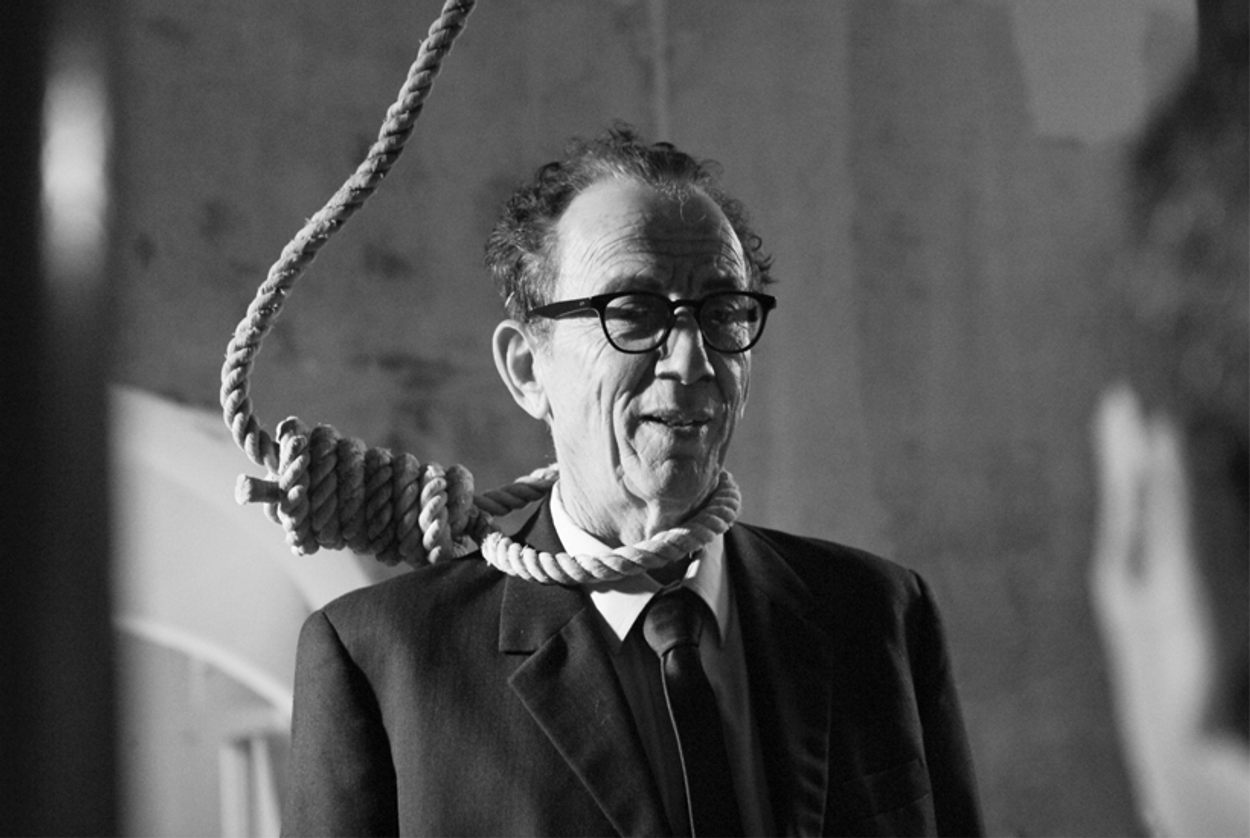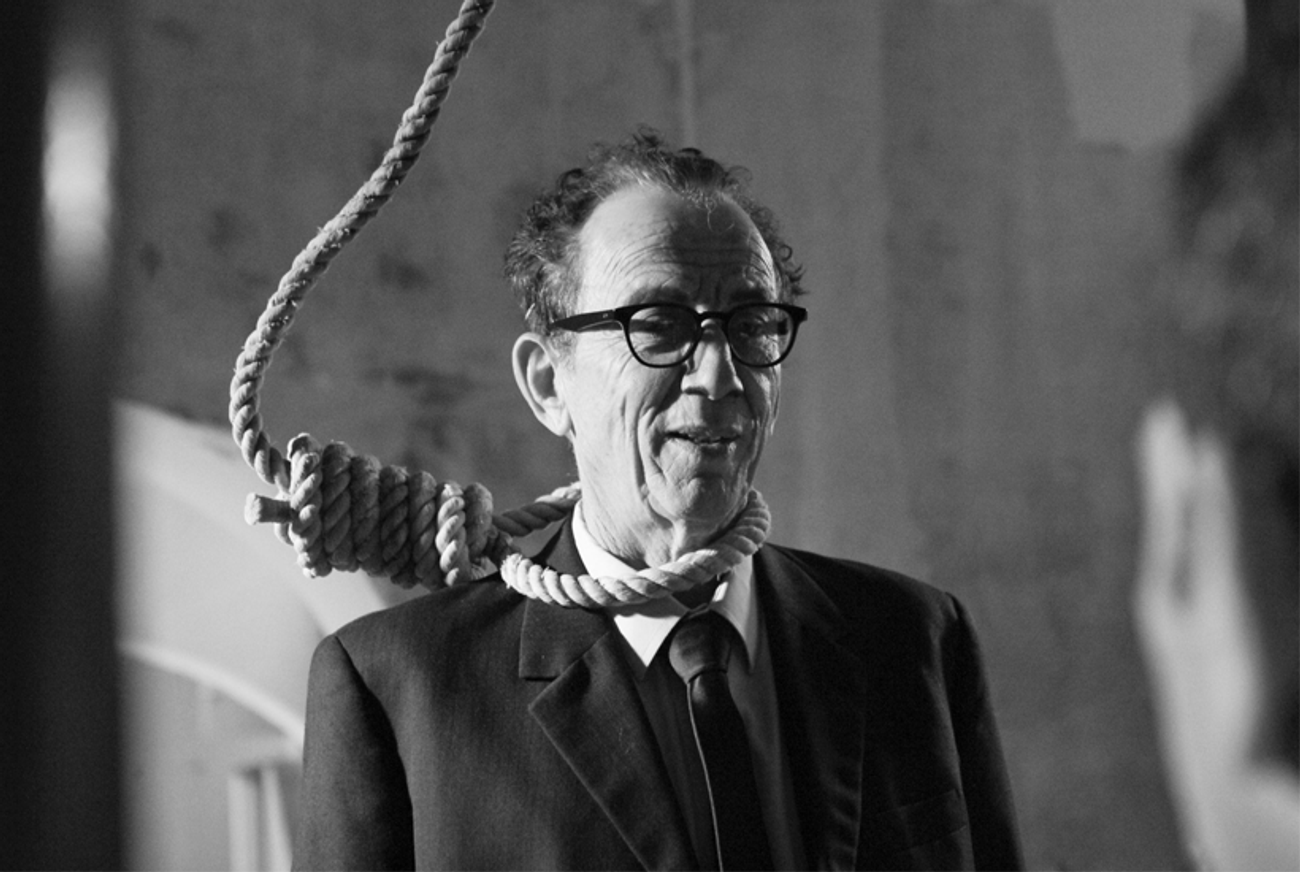Moses, Masada, and Eichmann Make Israel’s Newest TV Comedy Sparkle
‘Ha’Yehudim Ba’im’ takes on Jewish history, one sacred cow at a time




The door to the execution chamber opens. The condemned, a dark cloth sack covering his head, walks somberly forward, two policemen tightly holding each of his arms. The sack is removed, and the noose is placed loosely around his neck. The hangman gets ready, announcing that the deed shall now begin. Nothing happens. The condemned, an ordinary-looking man in a dark suit and square glasses, stands there, looking bored.
“How much time is it supposed to take?” asks the hangman.
“Until he suffocates,” his second in command replies.
They wait some more. Still, nothing.
Eventually, the condemned suggests that maybe they ought to put a trap door in the floor, so that he may be properly hanged. The guards are skeptical, but they finally comply. The execution begins anew. The noose is tightened, the trap door swings open, but the contraption is faulty and the prisoner remains unharmed. By now he looks annoyed. More failed attempts follow. Finally, the man in the dark suit can’t take it anymore: He performs his own execution, and this time it goes off without a hitch. “If you want to do something right,” he mutters as he draws his last breath, “you have to do it yourself.” He should know—he’s Adolf Eichmann, and unlike his amateurish Israeli guards, he’s a seasoned pro.
Thus begins Ha’Yehudim Ba’im, Hebrew for The Jews Are Coming, Israeli TV’s newest controversial satire and one of the best sketch shows to emerge from Israel in recent years, high praise considering the local scene’s alchemic ability to transform collective traumas into comedy gold. For extra points, the traumas the show mines aren’t drawn from the day’s headlines; they are rooted, rather, in the Bible, the Holocaust, and a host of other key turns in Jewish history.
Like Moses: In one of the show’s best bits, the leader descends from the mount, tablets in hand, ready to spread God’s new law. The people he commanded, the Bible tells us, were stiff-necked, A description which Ha’Yehudim Ba’im puts to high comedic effect.
“When you say, ‘Thou shall not take the name of the Lord thy God in vain,’ didn’t you just say his name?” asks one stubborn woman.
“No,” Moses replies, stuttering. “God is not his name.”
“So, what is his name?” the woman insists.
“His name is Ye … ” Moses starts, but then catches himself. “His name is God.”
“So, his name is God?” the woman says, growing irate.
“No,” Moses tries to weasel his way out of the thicket. “His name isn’t God. His name starts with a Y and ends with an A.”
“Yoda?” the woman asks, and Moses loses his cool.
It’s the kind of combination—perfect nonsense meets profound historical and literary erudition—that recalls Monty Python at its peak. That may sound like too much praise to heap on a show that has, to date, aired no more than two episodes, but Ha’Yehudim Ba’im has, from the first, had a hyper-fast metabolism: It is one of very few shows in Israeli TV history to have been canceled immediately after the airing of its first promo.
A take on a beloved children’s song, the 18-second clip featured actors portraying Rabin’s assassin, Yigal Amir, Baruch Goldstein, and Yona Avrushmi—who tossed a grenade into a crowd of left-wing demonstrators in 1983, killing one—frolicking in a colorful cartoonish dreamscape singing a happy tune about the pleasures of being right-wing maniacs. It aired in October of last year, shortly before the show itself was slated to debut on Israel’s public television station, and it was enough for right-wing Members of Knesset to decry it as incitement and for the Israel Broadcasting Authority to yank it off the air before even a single episode was broadcast. The show’s creators, two young writers named Natalie Marcus and Asaf Beiser, launched a dogged campaign, insisting that they had come up with nothing more pernicious than a “comic discussion of our history,” and that people ought to at least be able to watch a show before it is deemed too offensive. More than a year later, and following at least one major reshuffling of the IBA’s top brass, the show had its premiere last week.
Almost immediately it was heralded as both hilarious and significant, a double helix of praise reserved for very few products of popular culture. Some even compared it to Ha’Hamishiya Ha’Kamerit, a legendary comedy show from the 1990s known for its political daring and intellectual pedigree. At its best, Ha’Yehudim Ba’im is every bit as smart and as entertaining as any of its predecessors. In another skit, a young soldier goes to a military psychiatrist and asks to be dismissed from active duty. It’s a scene every young Israeli knows all too well: In Israeli army folklore, the psychiatrist figures prominently in many humorous stories about con artists pretending to be mentally unstable or threatening to kill themselves in an attempt to be dismissed from mandatory service. In the skit, however, things are different: The military psychiatrist is employed by the Jewish rebel army at Masada, and the young soldier coming to see him is threatening not to kill himself, which, considering the circumstances, comes off as just another ploy to shirk one’s duties.
It’s a great premise, but the belly laughs may turn out to be little more than an added value. The real pleasure of Ha’Yehudim Ba’im is the way in which it encourages young viewers to think critically about Jewish history and culture: Divine election, mass suicide, and vengeance against the Nazis are all profoundly loaded issues, and approaching them with humor is one of the best ways to safeguard against having them ossify into sacred monuments that tower beyond the range of introspection, criticism, and conversation. In that regard, Ha’Yehudim Ba’im is a very traditional show, the latest in a long chain of Jewish masterworks that have viewed Jewish history precisely as it is perhaps best understood: as a long, complicated, sometimes macabre but always uproarious cosmic joke.
***
Like this article? Sign up for our Daily Digest to get Tablet Magazine’s new content in your inbox each morning.
Liel Leibovitz is a senior writer for Tablet Magazine and a host of the Unorthodox podcast.
Liel Leibovitz is editor-at-large for Tablet Magazine and a host of its weekly culture podcast Unorthodox and daily Talmud podcast Take One. He is the editor of Zionism: The Tablet Guide.